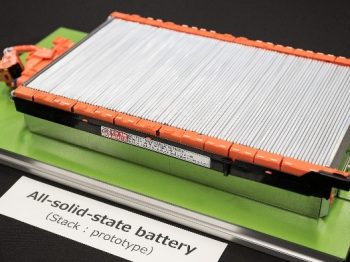‘Step change’ EV battery advances would be double-edged sword for fleets, warns FleetCheck
Predicted major advances in battery technology would represent a double-edged sword for fleets, FleetCheck has warned.

Toyota’s solid-state battery designs are one of a number of step changes potentially on the way
While the market has seemingly reached a stage where improvements in the range, charging speed and durability of electric vehicles are generally incremental, recent press reports suggest that “step change” developments could potentially be on the way.
Recent announcements include Toyota’s solid-state designs, CATL’s talk about doubling energy density and Mullen Automotive on improving battery management. A new electric sports car concept featuring breakthrough ‘six-minute-charge’ battery technology has also debuted.
Fleet software specialist FleetCheck says any advanced developments would bring mixed blessings for fleets.
Peter Golding, managing director, explained: “On one hand, these are good news. Anything that makes EVs more practical is to be welcomed, especially in the van and commercial vehicle sector where existing technology is presenting fleets with tricky issues but it also creates problems.”
Chief among these, he explained, was the possibility that a step change in battery technology could cause substantial harm to residual values on existing EVs.
“A manufacturer that has access to better batteries is going to want to make them available as soon as possible in order to gain a competitive market advantage but this is going to affect EVs already in use. It won’t render them obsolete but it could make them much less attractive, especially if the new tech is not just more effective but cheaper, which is conceivable.
“It’s not impossible that a business could buy 100 EVs today and then, a couple of years later, see their value dramatically affected. RVs are unlikely to collapse completely – these will still be practical, attractive vehicles for some used buyers – but there could be major reductions.
“This would have a substantial impact on leasing companies too, of course, who are already being very conservative in their EV future forecasts thanks to the quite dramatic drop in values seen over the last year. Buying EVs and bearing the RV risk remains a risky business.”
Golding added that there was no foreseeable way around the situation.
“EVs are still a relatively new technology in a mass market sense and step changes in technology are very much a possibility but any advances will probably be a double-edged sword and fleets need to factor that into their decision-making.”












